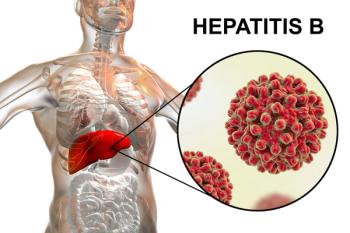
Study Explores Link Between Chronic Viral Infections and Long COVID
Underlying HIV infection was independently associated with neurocognitive long COVID symptoms.
Research published in the Journal of Clinical Investigation found an association between reactivated Epstein-Barr virus (EBV), HIV, and long COVID, but not cytomegalovirus (CMV).1
Michael J Peluso, MD, of the division of HIV, infectious diseases, and global medicine at the University of California in San Francisco, and colleagues conducted the study. They examined individuals who had recovered from COVID-19 to see how the chronic viral infections EBV, CMV, and HIV were associated with long COVID symptoms.
Researchers analyzed data from 280 adults with a history of COVID-19 infection and investigated their medical history, including HIV status. They also conducted serological testing to detect the presence of EBV and CMV. Peluso and colleagues performed statistical analysis to identify independent connections between these variables and long COVID symptoms.
The study found that chronic viral infections affected long COVID symptoms differently. The findings raise questions about the potential mechanisms underlying the associations between chronic viral infections and long COVID. Researchers reported that symptoms such as fatigue and neurocognitive dysfunction were independently associated with evidence suggesting recent reactivation of EBV or high levels of specific EBV antibodies. It is possible that the immune response to EBV reactivation or the presence of certain antibodies may contribute to the development of long COVID, researchers said. However, they said no association was found with ongoing EBV viremia.
Underlying HIV infection was independently associated with neurocognitive long COVID symptoms, researchers reported. They also said it had some connection to gastrointestinal symptoms. “EBV EA-D IgG positivity was significantly higher in participants with HIV, a condition which could have led to more robust EBV reactivation and subsequent long COVID symptoms,” Peluso and colleagues noted.
Participants with evidence of prior CMV infection were less likely to develop neurocognitive long COVID symptoms.1 They added that the negative association between CMV seropositivity and neurocognitive LC symptoms also needs further examination. “CMV seropositivity is associated with increased systemic inflammation, but a decreased odds of long COVID. This finding suggests that sources of inflammation unrelated to CMV may be driving long COVID risk in COVID-19 survivors and highlights the importance of the source of inflammation—as opposed to simply systemic inflammation itself—in mediating the risk of long COVID,” the authors wrote.
Study results suggest that chronic viral coinfections may have different effects on the likelihood of developing long COVID and may be associated with distinct patterns of symptoms. However, researchers noted that the presence of long COVID symptoms could not be fully explained by viral coinfections and that other factors may also play a significant role in long COVID.
Peluso and colleagues said that the study contributes to understanding the connections between chronic viral infections and the likelihood of different types of long COVID. However, they noted that more research is needed to determine whether these associations indicate a causal effect of viral coinfections or if they are influenced by other factors. The study highlights the need for comprehensive investigations during both the acute phase of COVID-19 and the recovery period to gain a deeper understanding of long COVID.
Peluso and colleagues said study limitations included that this cohort may not represent everyone with COVID-19 or long COVID, so more diverse participants are needed. In addition, the use of serological evidence to indicate recent EBV reactivation is not definitive. More research is needed to understand the dynamics of viral infections during the early phase of COVID-19.1
Peluso and colleagues emphasized the need for continued research to uncover the mechanisms behind long COVID and explore potential interventions to treat it. Researchers said that tissue-based studies would also be important to understand the underlying mechanisms of long COVID. Future studies can create focused treatments and improve understanding of this complicated condition by identifying the specific connections between viral infections and long COVID symptoms.1
Reference
1. Peluso MJ, Deveau TM, Munter SE, et al. Chronic viral coinfections differentially affect the likelihood of developing long COVID. J Clin Invest. 2023;133(3):e163669. doi:10.1172/JCI163669
Newsletter
Pharmacy practice is always changing. Stay ahead of the curve with the Drug Topics newsletter and get the latest drug information, industry trends, and patient care tips.























